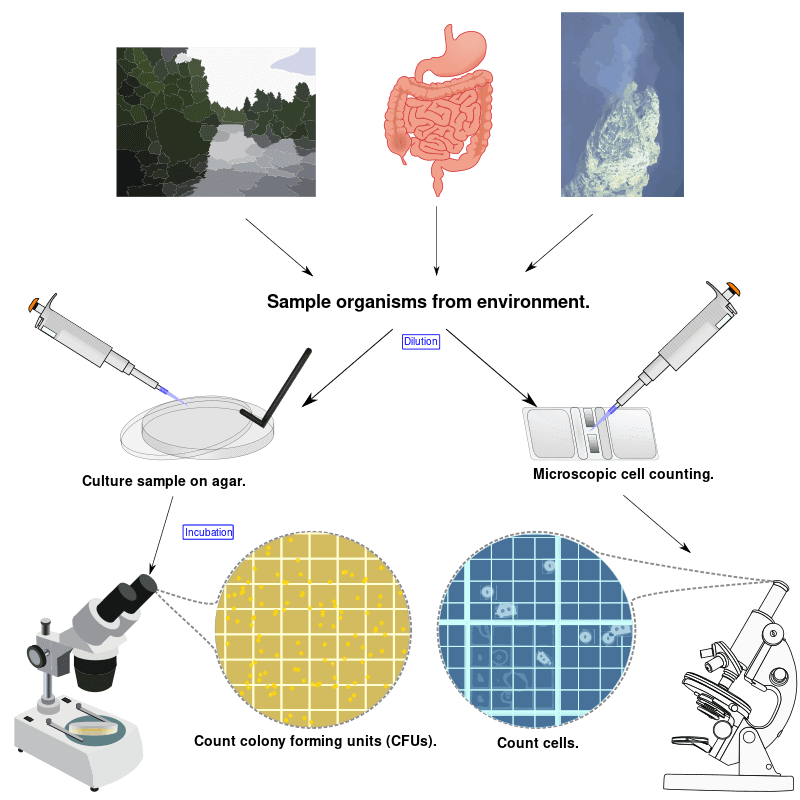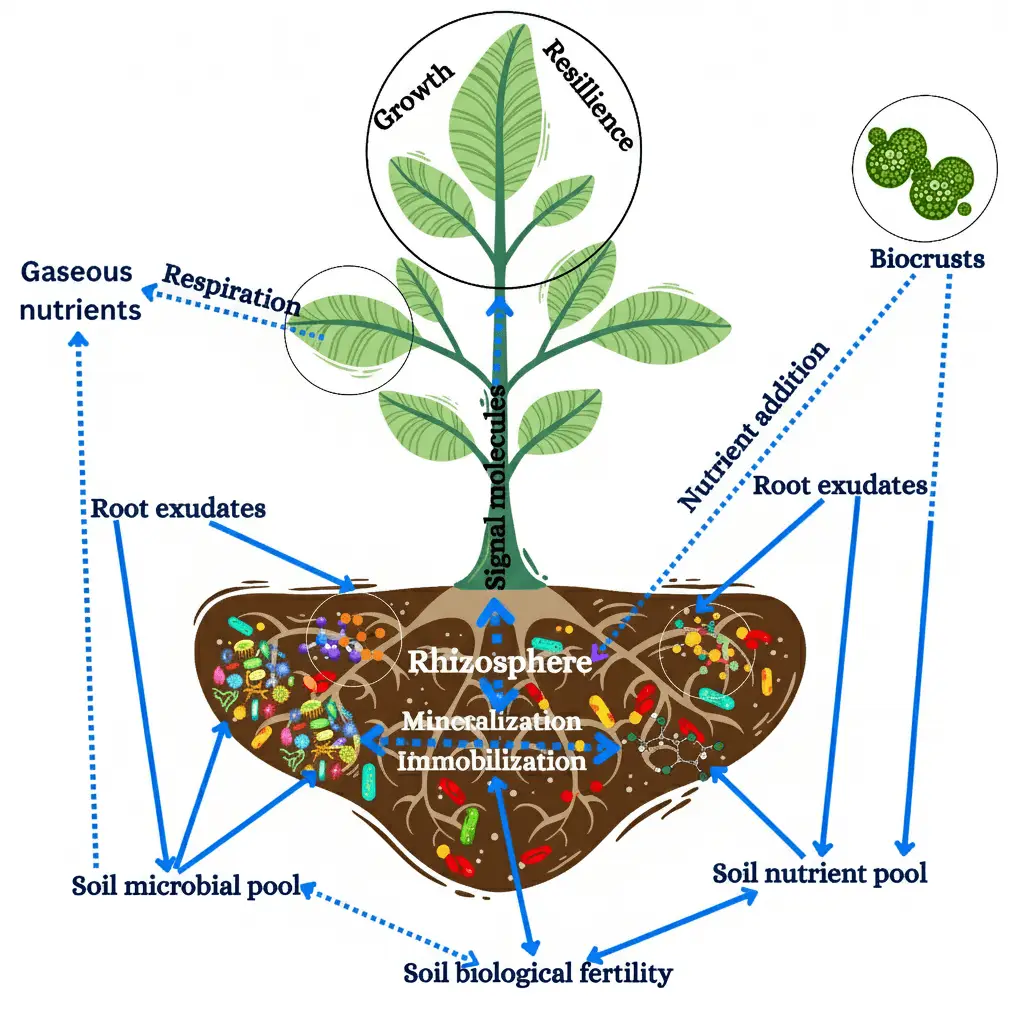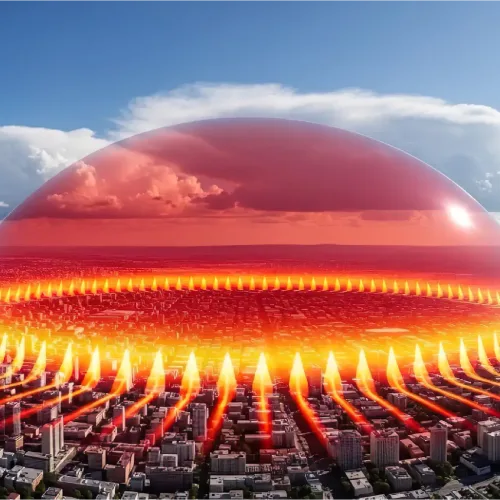Microbes may be tiny, but they powerfully shape every part of our world. Life depends on them more than we even realize. The soil we walk on, the food we eat, and even our own bodies are influenced by these invisible organisms. A huge part of human health and immunity is controlled by microbes. They quietly support the environment and many systems that keep our world functioning. Microbial ecology plays a vital role in keeping life active and balanced. Even though we can’t see them, microbes are constantly working behind the scenes, protecting our health, supporting ecosystems, and keeping natural processes running smoothly.
In this guide, you’ll see how closely microbial ecology and human health are linked. You’ll understand how the microbiome shapes both wellness and disease. You’ll also explore how environmental microbes influence our planet and discover real-life examples of how helpful microbes are already making a difference. This isn’t just theory, these insights give you practical ways to improve your health and protect the environment we all share.
What is microbial ecology?
Microbial ecology explores how microorganisms, like bacteria, archaea, fungi, protists, and viruses, interact with their surroundings. This field looks at how these tiny organisms live in their natural habitats, how widely they are spread, how many of them exist, and what important roles they play in keeping global ecosystems balanced and functioning.
Scales of Microbial Life
Microbes work across incredible scales and often set the rules for how bigger life forms survive and function.
- Micro-scale: At this level, microbes interact directly with their surroundings, like in dental plaque (biofilm on a tooth) or in the rhizosphere, the thin layer of soil affected by plant roots. Here, they compete intensely for nutrients, and these battles happen over just micrometers or millimeters.
- Meso-scale: This level includes local environments such as a soil patch, a lake, or even the human gut. Microbial communities here change based on nearby conditions like pH, oxygen levels, and how many nutrients are available.
- Macro-scale: On this global level, microbes influence huge Earth systems like the carbon cycle in oceans or the regulation of methane in the atmosphere. Just like plants and animals, microbial communities also follow clear distribution patterns around the world.
Key Ecological Principles in Microbial Systems
Microbial communities follow ecological patterns just like forests or coral reefs do. By understanding these rules, we can better predict how microbes react when their environment changes or gets disturbed.
1. Community Assembly & Resource Competition

When microbes enter a new place, they immediately start competing for the limited resources available. The ones that arrive first usually get an early advantage. They settle in and start growing before others even show up. This early occupation, known as the priority effect, plays a big role in deciding which species take control of that environment.
Most of microbial ecology revolves around this struggle for nutrients. Each microbe follows its own strategy. Some bacteria grow very fast when plenty of food is available, while others grow slowly but can survive longer when food becomes scarce. Because of these different survival methods, the whole microbial community ends up using resources more efficiently.
Scientists refer to this process as niche partitioning. In simple terms, every species picks its own role. Each one uses different nutrients or lives in slightly different spots within the same habitat. For example, in your gut, some bacteria feed on sugars while others break down hard plant fibers. This teamwork-like division stops one species from taking all the resources for itself.
2. Cross-Feeding and Metabolic Exchange
Microbes don’t just fight for survival, they also work together. One common form of cooperation is cross-feeding, where one microbe uses the waste released by another. This exchange of materials creates a chain of dependence that helps the entire community stay stable.
You can see a simple example inside your mouth. Certain bacteria break down complex sugars into simpler substances. Then, other bacteria feed on those substances and produce acids in the process. These acids can harm tooth enamel, which is why dentists study these interactions to design better ways to prevent cavities.
These networks of metabolism are far more complex than they seem. Just a teaspoon of soil can hold hundreds of microbial species, all trading thousands of different molecules at once. Due to advanced DNA sequencing and powerful computer models, scientists can now trace these hidden chemical routes and understand how these tiny communities function.
3. Stability, Resilience & Tipping Points
Strong microbial communities can handle change and quickly recover from disruptions. Scientists call this ability resilience. For example, a resilient gut microbiome bounces back fast after someone takes antibiotics. But if the microbiome is weak, it may shift to an unhealthy state and stay that way.
A tipping point happens when a microbial community crosses a limit and can no longer return to its original healthy balance. It’s similar to how a grassland can turn into a desert after too much grazing, once the damage is done, it doesn’t easily go back. Microbial communities can face the same kind of shift, and this can seriously affect human health or how ecosystems work.
Researchers are now learning to spot early warning signs before these tipping points happen. A drop in diversity or sudden changes in how the community behaves can show that the microbiome is losing resilience. By understanding these signals, doctors could step in early and stop small imbalances from turning into long-term diseases.
Microbial Ecology in the Natural World
Microbes dominate every ecosystem on Earth. Their ecological roles extend far beyond what their small size might suggest.
Soil and Plant-Microbe Interactions
Healthy soil holds more living organisms than any other ecosystem on Earth. Just one gram of rich soil can contain over a billion bacteria and long threads of fungi. These tiny life forms constantly break down organic matter, recycle nutrients, and make the soil fertile, so plants can grow stronger.
Plant roots build active partnerships with helpful microbes in a thin soil layer called the rhizosphere, the zone directly influenced by root activity. Mycorrhizal fungi stretch beyond the roots, collecting water and minerals and giving them back to the plant in exchange for sugars. In the same way, nitrogen-fixing bacteria living inside root nodules turn atmospheric nitrogen into a natural form of fertilizer that plants can actually use.
These natural partnerships have huge benefits in real farming. When farmers protect and support soil microbes, they can use fewer chemical fertilizers and pesticides. Books like Teaming with Microbes by Jeff Lowenfels encourage gardeners to work with soil life instead of fighting against it. This method, known as regenerative agriculture, boosts crop production while healing the land at the same time.
However, when intensive plowing, excessive fertilizers, or pesticides disturb the soil’s microbial life, the damage can last for years. Once soil degrades, it struggles to hold water, prevent erosion, and support healthy plant growth. The good news is that research shows soil microbes can bounce back when given the right conditions. This gives real hope for bringing back life to damaged farmlands.
Aquatic & Marine Microbial Ecology

Oceans cover most of Earth’s surface, and microbes rule these massive waters. Photosynthetic bacteria known as cyanobacteria create a large portion of the oxygen we breathe. Tiny single-celled algae sit at the bottom of marine food chains and support life all the way up to zooplankton and giant whales.
Marine microbes also help regulate the planet’s climate. They pull carbon dioxide from the air and move it deep into the ocean, where it can stay trapped for hundreds of years. This natural carbon pump helps slow global warming. However, increasing ocean temperatures and acidification are now disturbing these long-standing processes.
Freshwater environments have their own unique microbial life. Bacteria and algae in lakes, rivers, and wetlands break down organic matter and recycle nutrients. But when fertilizers wash into these waters, the sudden nutrient boost can throw the balance off. Microbial communities then shift and trigger harmful algal blooms, which release toxins and reduce oxygen levels in the water.
To keep water bodies safe, scientists track microbial activity to check water quality. The presence or absence of certain bacteria helps them identify pollution sources and detect possible disease risks. This kind of monitoring protects public health and supports efforts to restore damaged waterways.
How Microbial Ecology Shapes Human Health
The connection between microbial ecology and human health runs deeper than most people realize. We are not just individuals, we are ecosystems.
The Human Microbiome as Ecosystems
Our body carries almost as many microbial cells as it does human cells. These tiny organisms live everywhere, on our skin, inside our mouth, nose, lungs, and most abundantly in our digestive system. They are not just silent residents; they actively shape how our body works.
The gut microbiome carries out tasks that our own cells can’t handle. Helpful microbes break down dietary fiber and turn it into short-chain fatty acids that feed gut cells and help lower inflammation. They also create essential vitamins like B12 and K, vitamins we need but can’no’t produce on our own. These microbes even guide our immune system, helping it learn how to identify real threats.
Think of the microbiome as a rainforest. Just like a rainforest thrives on thousands of connected species, our gut also hosts hundreds of bacterial species that work together or sometimes compete. This diversity plays a key role, people with a richer variety of gut microbes are generally healthier and better able to resist disease.
Viewing the microbiome as an ecosystem changes our mindset about health. Instead of seeing microbes as enemies to destroy, we start valuing them as partners that support us. Books like I Contain Multitudes by Ed Yong explore these deep relationships and show why they are so important for human well-being.
Beneficial Microbes and Disease Prevention
Direct harmless by all sorts of microbes, particularly in the gut, prevent us from diseases. Good examples of such pro-dictates are probiotics. These are the “good bacteria” which prevent digestive problems and improve the health of your gut. Improving immunity, reducing inflammation and supporting overall wellness is promoting good bacteria.
Environmental Impacts of Microbial Life

Microbes play a vital role in ecosystems and help in to keep the environment in balance.
1. Microbes in Ecosystems
Microbial ecology shows that microbes serve as a natural cleaner. They break down organic material, recycle nutrients, and keep ecosystems functioning. As Carl Woese, a pioneering microbiologist, once said,
“The truth is, microbes run the world.”
Microbes Fighting against Pollution and Climate Change
Some microbes also help in the break down of harmful pollutants, and making them powerful companions of the environment. Some bacteria are capable of decomposing oil spills, while others can remove harmful chemicals from soil and water. Through these processes, microbes contribute to pollution control and help in to reduce environmental damage.
Microbial ecology opens our eyes that how these tiny creatures are impactful in every part of our lives. These tiny organisms play a role in keeping us healthy. They support our ecosystems. They even help in cleaning up our environment. As we learn more about microbial ecology, we discover new ways to use them in more processes. They aid both our health and planet.
By respecting microbial ecology, we can protect these invisible forces. Understanding them allows us to benefit from their significant role in our world.
Practical Takeaways: What Can We Do
Understanding microbial ecology isn’t just scientific theory, it can directly improve your health and environment. Here’s how you can apply it in your daily life:
Eat a diverse diet:
Beneficial microbes thrive on fiber and plant-based foods. Include a mix of vegetables, fruits, whole grains, and fermented foods in your meals. Aim for around 30 different plant foods a week, as research shows that dietary variety helps build a healthier and more diverse gut microbiome.
Use antibiotics wisely:
Antibiotics are powerful when truly needed, but taking them without necessity can harm beneficial microbes and increase resistance. Always ask if they are essential, especially for viral infections. If you need them, restore your gut balance by including probiotic and prebiotic foods afterward.
Spend time outdoors:
Nature exposes you to beneficial environmental microbes. Gardening, touching soil, walking in parks, or simply being around plants can strengthen your microbiome. Let children play outside freely, this natural exposure supports immune development.
Add fermented foods gradually:
Foods like yogurt, kefir, kimchi, and sauerkraut provide live microbes that offer short-term benefits and may influence your gut health. If you’re new to them, introduce them slowly so your system can adjust.
Care for the soil:
If you garden or farm, protect the soil microbiome by reducing tilling, adding compost, planting a variety of species, and limiting chemical fertilizers and pesticides. Healthy soil supports healthier ecosystems—and ultimately, healthier people.
Avoid overusing antimicrobial products:
Constant use of antibacterial soaps and strong sanitizers can wipe out good microbes and encourage resistance. Reserve these products for when they are truly needed, such as in medical settings or when soap and water aren’t available.
Keep learning:
Microbial science evolves quickly. Follow reliable sources, stay curious, and question products that make big claims about microbiome benefits without solid research behind them.
Support environmental health:
Healthy ecosystems foster microbial balance. Stand behind actions that protect soil, water, and biodiversity. Fighting pollution and supporting climate-friendly practices indirectly strengthens microbial life, benefiting both the planet and human health.
Conclusion
Microbial Ecology shows us that we truly live in a world ruled by microbes. These tiny organisms actively influence everything, from shaping the global climate to controlling our immune system and metabolism. The health of our soil, water, and even our own bodies depends on the rich and ever-changing microbial communities living within them.
As climate change and lifestyle diseases continue to rise, it becomes even more important to see ourselves and our surroundings through an ecological perspective. Understanding the powerful impact of environmental microbes opens the door to more sustainable and long-lasting solutions. When we support and increase microbial diversity in our environment and on our bodies, we give this unseen majority the power to maintain a healthier and more balanced world.
Want to test your knowledge take our simple Ecology Quiz test, and share your feedback in the comments.
Recommended Resources for Curious Minds
- I Contain Multitudes: The Microbes Within Us and a Grander View of Life by Ed Yong
- The Good Gut by Justin Sonnenburg and Erica Sonnenburg
- The Hidden Half of Nature by David R. Montgomery and Anne Biklé
- Basic Tools for Molecular Biology Lab
FAQs about Microbial Ecology
1. What is microbial ecology and why does it matter?Microbial ecology studies how microscopic organisms interact with each other and their environment. It matters because microbes drive essential planetary processes, influence ecosystem health, and directly affect human health through the microbiome.
2. How does the microbiome affect human health?Your microbiome performs crucial functions including digesting food, producing vitamins, training your immune system, and protecting against pathogens. Imbalances in microbial communities have been linked to inflammatory diseases, metabolic disorders, mental health conditions, and many other health issues.
3. Are all bacteria harmful?Absolutely not. The vast majority of bacteria are harmless or beneficial. Only a tiny fraction causes disease. Beneficial bacteria help with digestion, produce essential nutrients, protect against pathogens, and support immune function. We could not survive without our microbial partners.
4. Can I improve my microbiome?Yes! You can support a healthy microbiome by eating a variety of plant-based foods, avoiding unnecessary antibiotics, managing stress, staying active, and getting enough sleep. Adding fermented foods and prebiotic fiber can give your gut even more benefits. Still, everyone’s body responds differently, and scientists are continuing to study the best ways to improve the microbiome.
5. What is dysbiosis?Dysbiosis happens when the balance of microbial communities gets disturbed. It usually means the diversity of microbes drops, helpful species decrease, or harmful ones start to overgrow. Scientists have linked dysbiosis to many health conditions, although the exact changes in microbes differ from person to person and from one disease to another.
References
- Brock, T. D., & Madigan, M. T. (Microbiology: Biology of Microorganisms).
- Odum, E. P., & Barrett, G. W. (Fundamentals of Ecology).
- Falkowski, P. G. (Life’s Engines: How Microbes Made Earth Habitable).
- Bardgett, R. D., & van der Putten, W. H. (Belowground Biodiversity and Ecosystem Functioning).
- DeLong, E. F., & Karl, D. M. (Focus on the Marine Microbial Ecology field).
- Curtis, T. P., & Sloan, W. T. (Focus on Microbial Biogeography).
- Turnbaugh, P. J., et al. (The Human Microbiome Project Consortium Publications).
- Rook, G. A. (The ‘Old Friends’ Mechanism: Evolutionary Pressures on the Human Immune System).
- Kau, A. L., et al. (The Interplay Between Diet and the Gut Microbiota in Health and Disease).
- D’Argenio, V., & Salvatore, F. (The Role of the Gut Microbiome in the Host-Environment Metabolic Interaction).
- Rillig, M. C., et al. (Microbial Ecosystem Engineering).
- The International Scientific Association for Probiotics and Prebiotics (ISAPP).
- The One Health Initiative.




